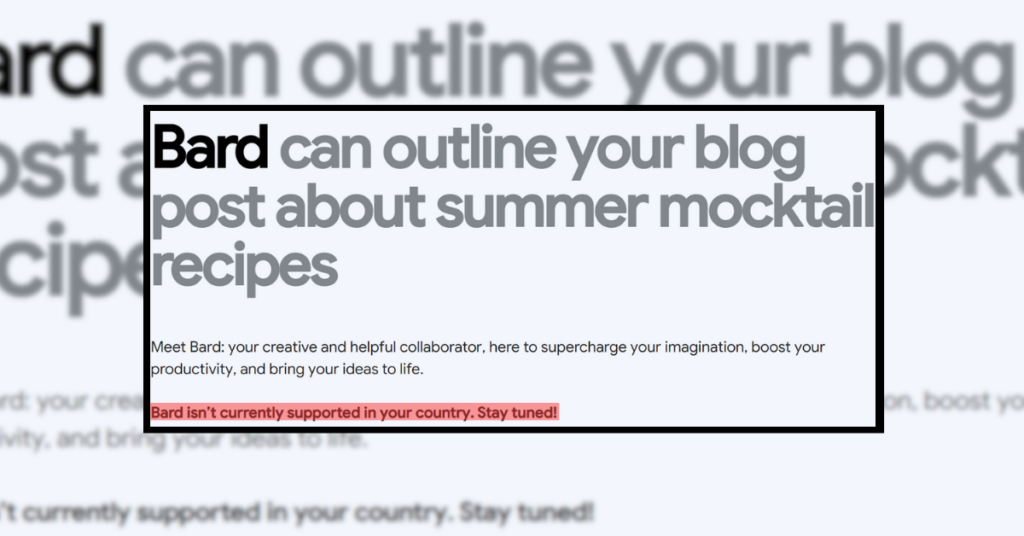Google Bard is officially released but only for US and UK users. Users of Spain will see the message “Bard isn’t currently supported in your country. Stay tuned!” and can’t join the waitlist yet and need to wait until Bard will be available in Spain in the coming days. Users from Spain can bypass the regional restrictions by using one of the VPN services: ExpressVPN, NordVPN, Surfshark VPN …etc.
But what is Google Bard and why should you care? In this blog post, we will explain what Google Bard is, how it works, how it compares to other AI chatbots like ChatGPT, and how you can use it for various purposes.
Use VPN to Acess Bard
Here are some of the best VPN services for 2023 according to PCMag:
Forbes Advisor recommends the following VPN services:
- NordVPN
- IPVanish
- VPN Unlimited (aka KeepSolid)
- ExpressVPN
- Surfshark
What is Google Bard?
Google Bard is an AI chatbot that can generate natural language responses to any prompt you give it. It uses a technology called LaMDA (Language Model for Dialogue Applications), which is based on Google’s Transformer neural network architecture. Google claims that Bard can handle any kind of conversation topic, from casual chit-chat to complex queries.
Google Bard is not a search engine or an assistant. It does not have a predefined personality or agenda. It simply tries to generate relevant and coherent responses by selecting words that are likely to come next. Google says that Bard is an “early experiment” and admits that it is not perfect. Sometimes it may make factual errors or produce nonsensical sentences.
Google Bard prompts
To use Google Bard, you need to join the waitlist. You cannot use a Google Workspace account or an account that belongs to someone under 18 years old. Once you get access to Google Bard, you can visit the website and sign in with your Google account.
You will see a chat window where you can type or speak your prompts. A prompt is anything you want to say or ask Bard. For example:
- Tell me a joke
- What are some benefits of meditation?
- Draft a packing list for my weekend fishing and camping trip
Bard will generate a response based on your prompt. You can also click on “View other drafts” to see alternative responses that Bard considered. You can give feedback to Bard by clicking on the thumbs-up or thumbs-down buttons. This helps Google improve its AI model.
You can also use the menu on the left side of the page to reset the chat, view your activity history, or access the FAQ section.
Google Bard Vs GPT-4
Google Bard and GPT-4 are two of the most advanced natural language generation systems in the world. They both use deep neural networks to produce coherent and diverse texts on various topics and domains. However, they also have some key differences in their architectures, capabilities and applications.
Google Bard is a system that specializes in generating content. It was developed by Google Research and first introduced in 2022. Google Bard uses a transformer-based model with a novel rhyme scheme detection module and a multi-modal attention mechanism. It can generate content in different languages, styles, and meters, as well as incorporate images and sounds as inputs or outputs. Google Bard can also perform style transfer, meaning it can rewrite a given text in a different poetic style.
GPT-4 is a system that aims to generate any kind of text for any purpose. It was developed by OpenAI and was first released in 2023. GPT-4 uses a massive transformer-based model with over one trillion parameters and a self-supervised learning approach. It can generate texts on any topic or domain, given some keywords or prompts as inputs. GPT-4 can also perform various natural language tasks such as summarization, translation, question answering, and dialogue.
Both systems have impressive strengths and limitations. Google Bard excels at creating artistic and expressive texts that appeal to human emotions and aesthetics. GPT-4 excels at creating informative and versatile texts that cover a wide range of domains and purposes.
